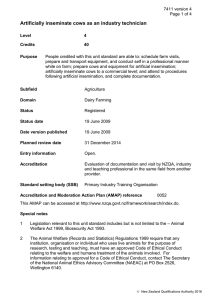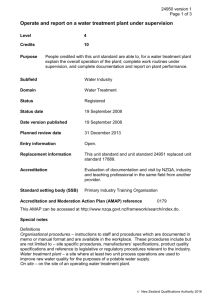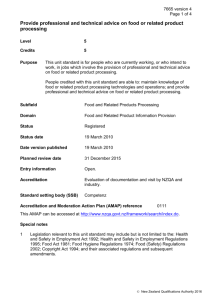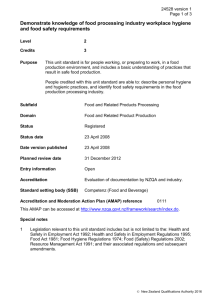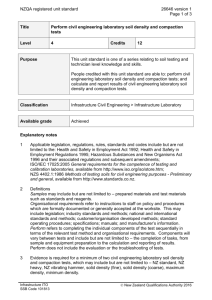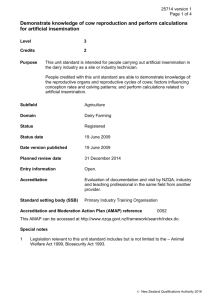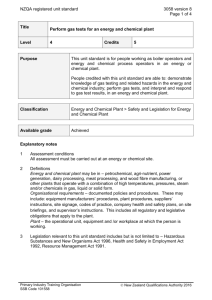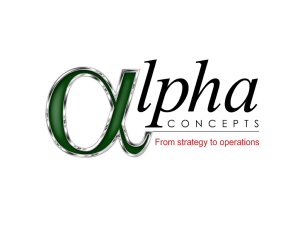17467 Artificially inseminate cows as a site technician
advertisement
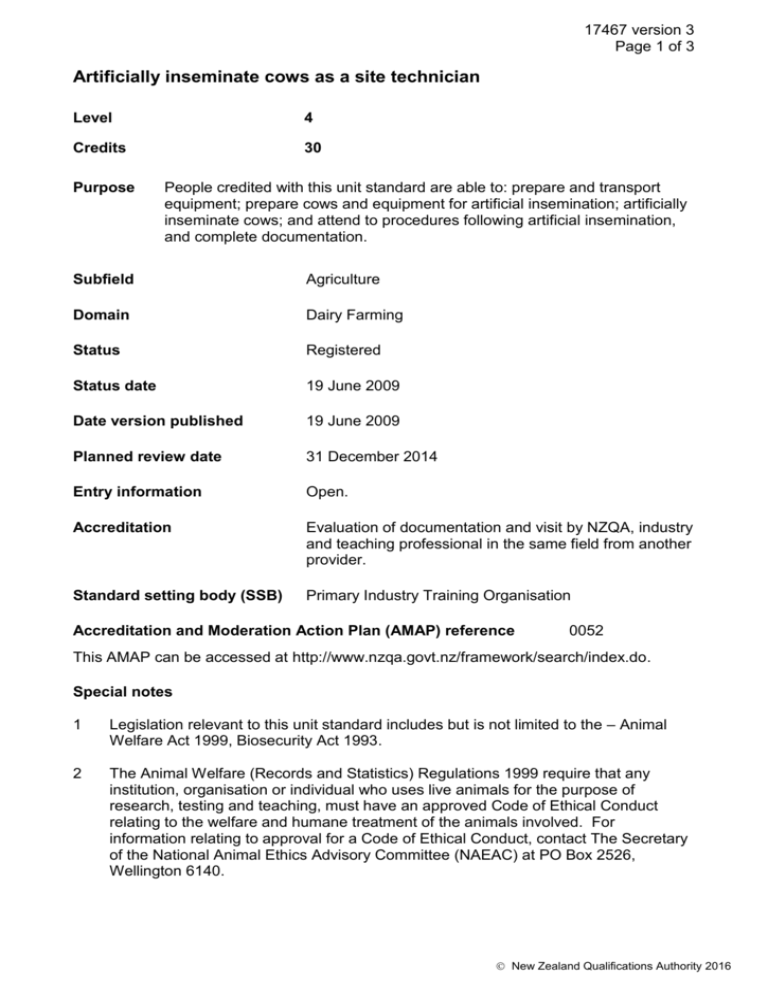
17467 version 3 Page 1 of 3 Artificially inseminate cows as a site technician Level 4 Credits 30 Purpose People credited with this unit standard are able to: prepare and transport equipment; prepare cows and equipment for artificial insemination; artificially inseminate cows; and attend to procedures following artificial insemination, and complete documentation. Subfield Agriculture Domain Dairy Farming Status Registered Status date 19 June 2009 Date version published 19 June 2009 Planned review date 31 December 2014 Entry information Open. Accreditation Evaluation of documentation and visit by NZQA, industry and teaching professional in the same field from another provider. Standard setting body (SSB) Primary Industry Training Organisation Accreditation and Moderation Action Plan (AMAP) reference 0052 This AMAP can be accessed at http://www.nzqa.govt.nz/framework/search/index.do. Special notes 1 Legislation relevant to this unit standard includes but is not limited to the – Animal Welfare Act 1999, Biosecurity Act 1993. 2 The Animal Welfare (Records and Statistics) Regulations 1999 require that any institution, organisation or individual who uses live animals for the purpose of research, testing and teaching, must have an approved Code of Ethical Conduct relating to the welfare and humane treatment of the animals involved. For information relating to approval for a Code of Ethical Conduct, contact The Secretary of the National Animal Ethics Advisory Committee (NAEAC) at PO Box 2526, Wellington 6140. New Zealand Qualifications Authority 2016 17467 version 3 Page 2 of 3 3 Definitions Level of accuracy is based on an 18-24 day non-return rate of no less than 8% below the district average 18-24 day non-return rate. This is based on at least 100 cows qualifying for inclusion in the 18-24 day non-return rate. Organisational standards and procedures refer to the documented training policies and procedures for animal handling and insemination, which must be approved by an approved Animal Ethics Advisory Committee (AEAC). 4 This is one of two unit standards that recognise the skills required to artificially inseminate cows. It is for technicians who require the technical knowledge and skills but are not required to achieve a commercial throughput rate. Unit 7411, Artificially inseminate cows as an industry technician requires the same level of accuracy but also includes a minimum throughput rate. Elements and performance criteria Element 1 Prepare and transport equipment. Performance criteria 1.1 Equipment sufficient for daily requirements is stored, handled, and transported in accordance with organisational standards and procedures. Range 1.2 includes but is not limited to – semen, insemination equipment, recording documents. Safety and hygiene while on farm are maintained in accordance with organisational standards and procedures. Element 2 Prepare cows and equipment for artificial insemination. Performance criteria 2.1 Equipment is laid out in accordance with organisational standards and procedures. 2.2 Cows presented are checked for consistency with details in mating document in accordance with organisational standards and procedures. Range 2.3 cow identification, bull identification, batch identification. Semen straws are loaded into inseminator according to type of semen, and without affecting viability of semen in accordance with organisational standards and procedures. Range fresh, frozen. New Zealand Qualifications Authority 2016 17467 version 3 Page 3 of 3 2.4 Liquid nitrogen and liquid nitrogen banks are handled and transported according to manufacturer's instructions and organisational standards and procedures. Element 3 Artificially inseminate cows. Performance criteria 3.1 Vulval area is cleaned in accordance with organisational standards and procedures. 3.2 The insemination procedure is carried out in accordance with organisational standards and procedures, and specified level of accuracy. Element 4 Attend to procedures following artificial insemination, and complete documentation. Performance criteria 4.1 Disposable equipment is discarded after use in accordance with organisational standards and procedures. 4.2 Re-useable equipment is cleaned in accordance with organisational standards and procedures. 4.3 Documentation is completed in accordance with organisational standards and procedures. Please note Providers must be accredited by NZQA, or an inter-institutional body with delegated authority for quality assurance, before they can report credits from assessment against unit standards or deliver courses of study leading to that assessment. Industry Training Organisations must be accredited by NZQA before they can register credits from assessment against unit standards. Accredited providers and Industry Training Organisations assessing against unit standards must engage with the moderation system that applies to those standards. Accreditation requirements and an outline of the moderation system that applies to this standard are outlined in the Accreditation and Moderation Action Plan (AMAP). The AMAP also includes useful information about special requirements for organisations wishing to develop education and training programmes, such as minimum qualifications for tutors and assessors, and special resource requirements. Comments on this unit standard Please contact the Primary Industry Training Organisation standards@primaryito.ac.nz if you wish to suggest changes to the content of this unit standard. New Zealand Qualifications Authority 2016
